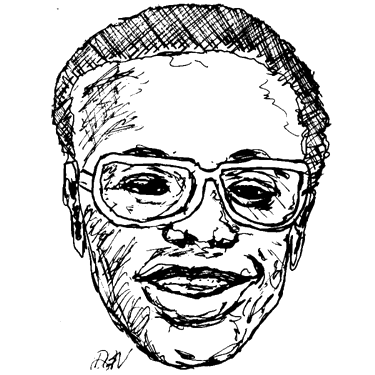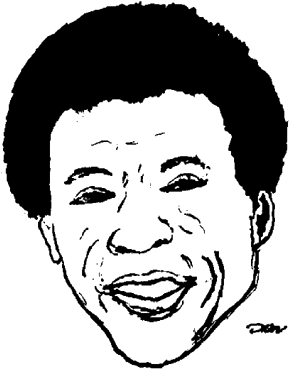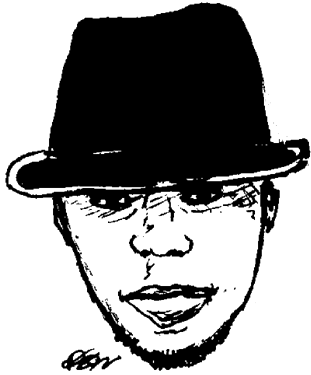


"(If You Want My Love) Put Something Down On It"
Bobby Womack
Composed by Bobby & Cecil Womack






 This was a Bobby Womack song--something I had no idea of at the time. And in my view, Vick has been trying to recapture the subtle magic of that obscure cut for quite awhile now, most recently and successfully on his new EP.
This was a Bobby Womack song--something I had no idea of at the time. And in my view, Vick has been trying to recapture the subtle magic of that obscure cut for quite awhile now, most recently and successfully on his new EP.
--Daddy B. Nice
About Bobby Womack
Bobby Dwayne Womack was born in Cleveland, Ohio on March 4, 1944. Bobby was onstage from his earliest years, joining his brothers Cecil, Curtis, Harry and Friendly, Jr. (after their father) in a gospel group--the Womack Brothers--that opened for the Soul Stirrers (Sam Cooke's gospel group) in 1953. Soon they were touring the country with other gospel acts.
According to accounts, the elder Womack, a strict and religious man, was so angry when the sons told him they had signed a recording contract with Sam Cooke's secular R&B label SAR, he disowned them. Cooke, of course, promptly stepped in--but the intertwining of Cooke's and Bobby Womack's career had just begun.
Cooke renamed the Womack Brothers the Valentinos--a dubious decision in retrospect but one which fit the temper of the times and the intertwining of early soul, doo-wop and rock--and the Valentinos scored with a Top 10 R&B hit, "Lookin' For A Love" in 1962. The Valentinos toured with James Brown during this time, and Bobby eventually joined Cooke's own band as guitarist.
The Valentinos' single "It's All Over Now," was covered by the Rolling Stones, then just a fledgling after-thought to the phenomenal Beatles, in 1964. The Stones' early discs were little more than white covers of American R&B, yet their steadfast enthusiasm for the genre was already influencing mainstream tastes, and "It's All Over Now" became the Stones' first number-one single on the English pop charts. The royalties alone made Womack a success, and he came to be regarded as Cooke's right-hand man and potential successor.
The murder of Sam Cooke in a California motel in 1964, just after the recording (and before the actual release) of Cooke's classic "A Change Is Gonna Come," marked the end of that heady period of Womack's musical innocence. Before a satisfactory mourning period had transpired, Bobby Womack married Sam Cooke's widow--many years his elder--incurring the wrath of his R&B peers, who condemned the union as crass and opportunistic.
Suddenly Womack, the heir-apparent to the King Of Soul, was anathema in the African-American community, and the black audience wanted nothing to do with his records, whether issued as a solo artist or under the auspices of the Valentinos (the Womack Brothers). Bobby Womack was forced to start all over again, with greatly reduced expectations.
The only avenue open to him was studio work, and Womack caught on with with Ray Charles (always an objective and efficacious connoisseur of talent) and then with producer Chips Moman. The latter brought him south to Memphis and Muscle Shoals, and slowly but surely Bobby Womack reinvented himself as a behind-the-scenes songwriter and studio musician, contributing backing tracks and dozens of songs for the likes of Wilson Pickett, Aretha Franklin, Joe Tex and King Curtis in the mid-to-late sixties.
But (perhaps to the surprise of latter-day black purists), Bobby Womack did not stop there. Buoyed by increasing recognition for his behind-the-scenes work, and despite repeated failures to launch his own solo career, Womack plunged whole-heartedly into covering the popular (white) music of the day, recycling sentimental favorites like "Fly Me To The Moon," composing jazzy hits like "Breezin'" (later to become one of jazz guitarist George Benson's signature songs), and working with rock icons like Janis Joplin, J. Geils and--perhaps most notably--psychedelic-crossover artist Sly Stone on his seminal album, There's A Riot Goin' On.
Finally, in 1971, Bobby Womack broke through as a solo artist with the aptly-titled album Communication (United Artists), and the song many consider (after "Looking For A Love") to be his first bona fide hit single: "That's The Way I Feel About You." 1972's Understanding spawned the hit singles, "Woman's Gotta Have It" and "Harry Hippie." And subsequent albums (the soundtrack Across 110th Street, The Facts Of Life and Lookin' For A Love Again made Womack a full-fledged star nearly twenty years after he began performing.
Many of these early-seventies' hits have taken on additional significance over time as movie directors like Spike Lee (whose first film, "She's Gotta Have It," paid homage to "Woman's Gotta Have It") and Quentin Tarantino (whose Pam Grier vehicle "Jackie Brown" eulogized "Across 110th Street") shed renewed light on the decade.
Womack divorced Barbara Campbell (the late Mrs. Sam Cooke) in 1971 (his step-daughter Linda was a co-writer of "Woman's Gotta Have It)." Womack's brother Harry (the inspiration for "Harry Hippie") was murdered in 1974, and Womack's own son (by new wife Regina Burks) died in 1979. In between, a disastrous crossover-country album and a couple of subsequent R&B releases failed to register much success.
After a recording hiatus, Womack eventually reappeared on small label Beverly Glen with one of his most durable hits, "If You Think You're Lonely Now" (The Poet, 1981). Again switching labels, Womack scored a memorable hit: "I Wish He Didn't Trust Me So Much" (MCA, 1985).
Through it all, Womack "lived the life," hanging out with rock stars like The Rolling Stones, who have remained lifelong friends. In 1985 he appeared with Bruce Springsteen, Miles Davis, Pete Townshend and many other international celebrities on Little Stevie Van Zandt's "Sun City" anti-apartheid charity-concert compilation.
Womack's songs have aged well, covered by innumerable stars over the last three decades including K-Ci & JoJo ("If You Think You're Lonely Now," "Woman's Gotta Have It"), Millie Jackson and Vick Allen ("Put Something Down On It"), "I Wish He Didn't Trust Me So Much" (Sir Charles Jones and Willie Clayton), "Across 110th Street" (the movies "Jackie Brown" and "American Gangster"), Jodeci ("If You Think You're Lonely Now"), the J. Geils Band ("Looking For A Love") and The Rolling Stones ("It's All Over Now"), to name only a few.
Today Bobby Womack's reputation is one of the most secure in the R&B constellation. He is generally considered to be the legitimate successor to Sam Cooke, Curtis Mayfield and Marvin Gaye as an unparallelled purveyor of lyrically-gifted soul music.
Tidbits
1. Books that fans of Bobby Womack will not want to miss:
Bobby Womack : Midnight Mover: The True Story of the Greatest Soul Singer in the World
Sly and the Family Stone: An Oral History, Vol. 4
2. February 23, 2008. Here is a letter received from an alert reader and Bobby Womack fan:
RE: BOBBY WOMACK'S "PUT SOMETHING DOWN ON IT"
Daddy B. Nice:
I read your article on Millie Jackson on your excellent site. This is the type of stuff I've been looking for! A definite thank you & kudos to you. There was only one thing that stood out and it has irked me to no end for years, so I have to let this off my chest and hope that you can help to straighten out this travesty.
The original "Put Something Down On It" was actually robbed of its string section by whomever it was that produced &/or arranged "Do You Think I'm Sexy." If you listen to Bobby Womack's version, that very riff that you find in Rod Stewart's song (& subsequent remakes) is in the intro of Bobby's song. I don't know if even Mr. Womack knows it (I've never seen or heard him address it) or if there was some special arrangement made, but Bob was robbed!
I've wanted for years for someone else to pick up on this because I didn't know who to "complain" to, but maybe you & your site will help me put this thing to rest & at least in my own head!
Thanks for listening to my ramblings &
Sincerely,
D.B.
Daddy B. Nice replies:
Dear D.B.,
I really apreciate this letter. This is why I muck around, asking questions and poking my nose into things and often making a fool of myself trying to explore the connections between records. Sooner or later someone like you pops out of the woodwork with the real details.
I can remember New York City disco days in the 80's, dancing our butts off to the Carmine Appice-written Rod Stewart song "Do Ya Think I'm Sexy," going absolute ecstatic over that string-section hook, as if we were just a couple of dance moves away from heaven's gates, never having an inkling that (as has repeatedly been the case in popular music) it was lifted from Bobby Womack's orginal R&B version of "Put Something Down On It."
Again, many thanks. DBN
3. January 30, 2009.
Bobby Womack will be inducted into the Rock & Roll Hall of Fame in 2009, according to "Rolling Stone" Magazine. The ceremony will unfold April 4th in the Rock & Roll Museum, which just happens to be in Womack's home town, Cleveland, Ohio. "Having this happen in my home town is really icing on the cake," Womack said. "My very first thought was, 'I wish I could call Sam Cooke and share this moment with him.'"
DBN
***********
4.
Daddy B. Nice's Update, January 1, 2010.

Calvin Richardson, along with Anthony Hamilton, was a serious contender for Daddy B. Nice's Top 100 Southern Soul Artists chart for many years, although he was never a part of that core group of artists that make up the genre.
Then, in August of 2009, with little fanfare, Richardson released Facts Of Life: The Soul Of Bobby Womack.
By the end of the year the song "Harry Hippie," which had never been one of Bobby Womack's strongest classics, began playing on Southern Soul radio stations in the Delta. To the inattentive, it was easy to believe it was actually a deejay playing Womack's original, but as the song garnered more and more airplay, it became obvious this was a cover, sumptiously recreated, by an artist who had tapped into the mainline soul of the composition.
The artist was Calvin Richardson, and it was from his tribute album to Womack, which comes highly recommended. Coincidentally, Richardson began appearing in chitlin' circuit venues, most notably a New Year's Day concert with Southern Soul notable Willie Clayton at the Central City Complex in Jackson, Mississippi.
The coming together of these various elements has not only raised Calvin Richardson's profile in the Southern Soul world--a welcome and fortuitous event--but reinforced the legacy of one of Southern Soul's most soulful and essential forefathers, Bobby Womack.
--Daddy B. Nice
Bargain-Priced Facts Of Life: The Soul Of Bobby Womack
**********
5. July 28, 2014:
 Vick Allen first came to your Daddy B. Nice's attention with his cover of Bobby Womack's "Put Something Down On It," from the album LET'S DANCE.
Vick Allen first came to your Daddy B. Nice's attention with his cover of Bobby Womack's "Put Something Down On It," from the album LET'S DANCE.
Listen to Vick Allen singing "Put Something Down On It" on YouTube.
The song marked Vick Allen's first entry into Daddy B. Nice's Top 100 Southern Soul Songs (90's-00's).
If You Liked. . . You'll Love
EDITOR'S NOTE:
In the late nineties, when I first began to visualize a charting of Southern Soul music, my overriding motive was to correct what I perceived to be a grievous wrong. When I searched the Internet for information on the great musicians I heard on radio stations on my trips through the South, I could find nothing about them. I was able to find information on blues and soul artists up to about the 1980's, but anything more contemporary was still a "dark continent"--unknown, unexplored and unmemorialized. Even "southern soul" was a suspect and tentative term, used mainly as an adjective to describe older artists geographically tied to the Deep South.
To help right that wrong, I went about constructing a Top 100 chart of the best Southern Soul artists from the 90's to the present, and I profiled those performers in "artist guides." But when I had finished that chart (Daddy B. Nice's Top 100), I again found myself faced with a wrong. This time the oversight was my lack of attention to the artists whose best material had been recorded prior to the 90's and 00's, artists without whom the Southern Soul phenomenon would never have occurred. Yes, one could find information on these performers on the Internet, but not up-to-date information, and not in the context of contemporary Southern Soul.
That is what brought me to formulate the chart you are reading: "Forerunners." Rhythm & Blues as it's played, appreciated and revered in the Deep South. The Golden Oldies of the Chitlin' Circuit. The artists who "count" and the songs that "matter" to the artists, deejays and producers who understand and create the Southern Soul sound. And that's different--although not altogether different--from the soul music many of us grew up listening to outside the Deep South. Although fans may be coming to this music long after it was first recorded, I believe it will only whet their appetite for Southern Soul music all the more. DBN.
Honorary "B" Side
"If You Think You're Lonely Now"
































































©2005-2026 SouthernSoulRnB.com
All material--written or visual--on this website is copyrighted and the exclusive property of SouthernSoulRnB.com, LLC. Any use or reproduction of the material outside the website is strictly forbidden, unless expressly authorized by SouthernSoulRnB.com. (Material up to 300 words may be quoted without permission if "Daddy B. Nice's Southern Soul RnB.com" is listed as the source and a link to http://www.southernsoulrnb.com/ is provided.)
